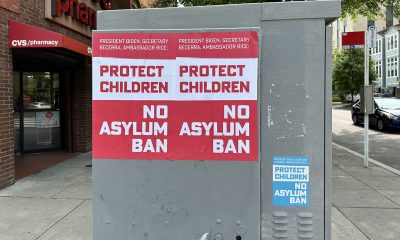National
Bi-national couples await relief under Obama policy change
New hope, as immigration enforcement shifts focus

Brian Andersen is nervously awaiting a phone call from U.S. immigration officials.
Andersen, an American citizen who married his spouse, Anton Tanumihardja, an Indonesian national, in D.C. in June, hopes that U.S. Immigration & Customs Enforcement will deem the deportation proceedings against Tanumihardja to be a low priority and take him out of the pipeline for potential separation from the country.
“To be a little cliche, it really would feel like a burden would be lifted from our shoulders,” Andersen said. “Of course I do know in the back of my mind, that certainly isn’t the end of the road, but it would certainly take the immediate threat away of the government tearing my spouse away from me.”
MORE IN THE BLADE: DHS GUIDANCE ON IMMIGRATION OMITS SAME-SEX COUPLES
Such an opportunity is possible for Andersen and Tanumihardja thanks to new guidance that the Obama administration unveiled last week in immigration policy. In a letter to the Senate, Secretary of Homeland Security Janet Napolitano last week indicated that authorities will conduct a case-by-case review of the approximately 300,000 undocumented immigrants facing possible deportation to determine which cases are high priority and low priority for separation from the country.
Those who have been convicted of crimes or pose a security risk will be a higher priority for deportation, while those who are deemed lower priority will be taken out of the pipeline. Administration officials will weigh a person’s ties and contributions to the community and family relationships. The Obama administration has said these criteria are inclusive of LGBT families and same-sex couples.
Tanumihardja has lived in the United States since 2002 and has sought residency in the United States through the asylum process. After losing his bid for residency through this process, he was served with a final deportation order and was set for separation on Feb. 14. However, immigration officials postponed the deportation temporarily and Tanumihardja must continue to check in with ICE officials. At any time, the deportation office can set a date for his separation from the country.
Andersen, who lives in Philadelphia with his spouse, said a call from ICE removing Tanumihardja from proceedings would provide immediate relief until action is taken to repeal the Defense of Marriage Act, which prohibits federal recognition of same-sex marriage.
“It doesn’t solve the larger issue of the discrimination of the Defense of Marriage Act, and still wouldn’t allow me to sponsor Anton for permanent residence, but it is a step in the right direction and would allow us the peace of mind knowing we can stay and continue to fight together for full marriage equality,” Andersen said.
Under current immigration law, straight Americans can sponsor their spouses for residency in the United States through the green card application process if their spouses are foreign nationals. The same rights aren’t available to gay Americans because the Defense of Marriage Act prohibits federal recognition of same-sex unions, which are only legal in six states and D.C.
Consequently, foreign nationals who are in committed relationships with gay Americans may have to leave the United States or face deportation — which could mean separation from their partner — if these foreign nationals are discovered to be undocumented or upon expiration of their temporary visas. The new policy guidance offers an opportunity for the Obama administration to cancel the deportation of these foreign nationals, enabling them to remain in the country with their partners.
Lavi Soloway, founder of Stop the Deportations and an immigration lawyer who handles deportation cases for same-sex couples, said Napalitano’s guidance demonstrates the Obama administration is offering “a greater degree of sensitivity” to LGBT families.
“Those individuals who are facing deportation, but who are married to a gay or lesbian American citizen have a more receptive Department of Homeland Security to communicate their request for prosecutorial discretion than perhaps a few weeks ago,” Soloway said.
The change builds off an existing June 17 memo from the Department of Homeland Security enabling immigration officials to exercise discretion in deportation cases that aren’t deemed high priority. Soloway said the guidelines now are still the same as when this earlier memo was issued, but the administration has signaled “an aggressive interest in setting aside low priority cases, and that would include cases involving LGBT families.”
But Soloway noted that the Obama administration has offered no timeline for when officials will complete the removal of foreign nationals in same-sex marriage from the deportation pipeline, nor whether this change would mean an end to all DOMA-related deportations.
“We don’t know how long it will take for the government to work through its pipeline of cases, and so any bi-national couples who are at risk of being torn apart through deportation should be advocating for themselves and should be presenting the evidence and making the argument to deportation officers or prosecutors,” Soloway said.
Gillian Christensen, a spokesperson for the Department of Homeland Security, responded to the Blade’s request to comment on timing with the following statement.
“ICE is focused on smart, effective immigration enforcement that prioritizes the removal of criminal aliens, recent border crossers and egregious immigration law violators, such as those who have been previously removed from the United States,” Christensen said. “The agency exercises prosecutorial discretion, on a case by case basis, as necessary to focus resources on these priorities.”
One couple that had been in deportation proceedings has already found relief after Napolitano issued the new guidance. Alex Benshimol and Douglas Gentry, a married gay bi-national couple in California, learned on Saturday that ICE dropped proceedings against Benshimol, a Venezuelan native.
In a statement, Gentry said the decision by ICE to exercise prosecutorial discretion and take Benshimol out of the deportation pipeline, effectively taking him out of danger, is “extremely encouraging.”
“This should bring hope to so many couples in our situation,” Gentry said. “As happy as Alex is, he’s still uncertain. We will still have to fight for full equality because DOMA prevents me from petitioning for his green card. But the constant fear of exile or separation is over, and for that we’re very grateful.”
The case marks the second time this year that ICE has dropped deportation proceedings against a same-sex couple. In July, immigration officials discontinued proceedings against Henry Velandia, a gay Venezuelan national, who lives in New Jersey with his spouse, Josh Vandiver.
Another couple that could receive a call from ICE and obtain relief is Sujey and Violeta Pando. The Denver, Colo, couple, who have been together five years and married last year in Iowa, received media attention last week after an immigration judge decided to postpone deportation proceedings against Sujey, a Mexican national, until January.
Violeta told the Blade that a phone call from ICE informing the couple that Sujey would be taken out of the pipeline for deportation would make them “so happy there’d be no words to describe the feeling.”
“I think there’s a possibility because under Secretary Napolitano’s memo, it listed some categories, and Sujey fits all those categories,” Violeta said. “So, I don’t see why not, she has ties to the community, she’s married to me, she’s not a criminal.”
Growing up in Mexico, Sujey was ostracized by her family for being a tom-boy and says she was raped and beaten growing up. At the age of 16, she was brought into the United States. Her deportation troubles started in 2008, when she was arrested after a traffic violation and taken to jail. ICE was notified and deportation proceedings started against her.
The specter of deportation, Violeta said, still concerns the couple and they don’t know what action they’d take if a deportation was ordered against Sujey.
“We try not to look at that as an option,” Violeta said. “I don’t know what I would do. We don’t look at that as an option, we need to fight for this. It all goes back to DOMA. So, no, not an option.”
But the new guidance would only affect gay foreign nationals who are currently facing deportation proceedings. Gay foreign nationals in same-sex relationships who are seeking legal status and protections, but haven’t yet had deportation proceedings started against them, aren’t affected the Obama administration’s change.
One such bi-national same-sex couple is Bradford Wells, a U.S. citizen, and Anthony John Makk, an Australian national. The San Francisco couple were married in Massachusetts seven years ago and have lived together 19 years. Wells and Makk came into public view earlier this month after the San Francisco Chronicle profiled them and reported that U.S. Customs & Immigration Enforcement on July 26 denied Makk a marriage-based green card for residency on the basis of the Defense of Marriage Act.
Makk is the primary caregiver for Wells, who’s living with AIDS. Wells told the Blade he’d be faced with significant challenges in continuing to care for himself should the U.S. government order deportation of his spouse.
“If he was deported, I’d be here all alone, I wouldn’t have anyone to assist me,” Wells said. “I would find it impossible to take care of all the things I would need to take care of to manage my day-to-day life. I would not be able to do everything I have to do.”
Steve Ralls, a spokesperson for Immigration Equality, which is handing Wells and Makk’s case, said their story underscores the fact that same-sex immigrant families need earlier intervention and a more permanent solution to put them on equal legal footing with opposite-sex couples.
“While the administration’s decision to intervene and halt deportation proceedings is a welcome step in the right direction, our government should not be forcing couples to face a worst-case scenario in order to receive even minimal relief,” Ralls said.
To ensure greater protection, Ralls said the Obama administration should implement a policy of holding spousal applications for married bi-national same-sex couples until either the courts or Congress lift DOMA from the books.
“That allows more families to maintain legal status, and legal protections, which is a far better option than waiting until deportation orders are issued and families have been forced out of status,” Ralls said. “The administration has offered to loosen the noose in a last-minute reprieve for some families. Instead, they should be stepping up, and offering help, before families are faced with such dire circumstances.”
Immigration Equality on Wednesday appealed the denial of the marriage-based green card to U.S. Citizenship & Immigration Services. The appeal gives him no legal status while pending, but if granted, would then place him back in legal status. Ralls said an attempt to remove him while the appeal is pending would be unusual because a successful appeal would permit him to remain in the United States legally.
Even though the policy change wouldn’t directly impact the San Francisco couple, Wells said he thinks the more rigorous attention that bi-national same-sex couples would receive under the case-by-case examination of deportation proceedings makes him feel “there could be hope at the very end of the road.”
“There is a possibility that if we find ourselves at the very end of the road that he may get deferred action and they won’t actually put him on a plane and fly him back to Australia, but we’re not there yet and I’m trying to get some relief before we get there,” Wells said.
NOTE: This article has been updated.
Federal Government
Lambda Legal praises Biden-Harris administration’s finalized Title IX regulations
New rules to take effect Aug. 1

The Biden-Harris administration’s revised Title IX policy “protects LGBTQ+ students from discrimination and other abuse,” Lambda Legal said in a statement praising the U.S. Department of Education’s issuance of the final rule on Friday.
Slated to take effect on Aug. 1, the new regulations constitute an expansion of the 1972 Title IX civil rights law, which prohibits sex-based discrimination in education programs that receive federal funding.
Pursuant to the U.S. Supreme Court’s ruling in the landmark 2020 Bostock v. Clayton County case, the department’s revised policy clarifies that discrimination on the basis of sexual orientation and gender identity constitutes sex-based discrimination as defined under the law.
“These regulations make it crystal clear that everyone can access schools that are safe, welcoming and that respect their rights,” Education Secretary Miguel Cardona said during a call with reporters on Thursday.
While the new rule does not provide guidance on whether schools must allow transgender students to play on sports teams corresponding with their gender identity to comply with Title IX, the question is addressed in a separate rule proposed by the agency in April.
The administration’s new policy also reverses some Trump-era Title IX rules governing how schools must respond to reports of sexual harassment and sexual assault, which were widely seen as imbalanced in favor of the accused.
Jennifer Klein, the director of the White House Gender Policy Council, said during Thursday’s call that the department sought to strike a balance with respect to these issues, “reaffirming our longstanding commitment to fundamental fairness.”
“We applaud the Biden administration’s action to rescind the legally unsound, cruel, and dangerous sexual harassment and assault rule of the previous administration,” Lambda Legal Nonbinary and Transgender Rights Project Director Sasha Buchert said in the group’s statement on Friday.
“Today’s rule instead appropriately underscores that Title IX’s civil rights protections clearly cover LGBTQ+ students, as well as survivors and pregnant and parenting students across race and gender identity,” she said. “Schools must be places where students can learn and thrive free of harassment, discrimination, and other abuse.”
Michigan
Mich. Democrats spar over LGBTQ-inclusive hate crimes law
Lawmakers disagree on just what kind of statute to pass

Michigan could soon become the latest state to pass an LGBTQ-inclusive hate crime law, but the state’s Democratic lawmakers disagree on just what kind of law they should pass.
Currently, Michigan’s Ethnic Intimidation Act only offers limited protections to victims of crime motivated by their “race, color, religion, gender, or national origin.” Bills proposed by Democratic lawmakers expand the list to include “actual or perceived race, color, religion, gender, sexual orientation, gender identity or expression, ethnicity, physical or mental disability, age, national origin, or association or affiliation with any such individuals.”
Democratic Gov. Gretchen Whitmer and Attorney General Dana Nessel have both advocated for a hate crime law, but house and senate Democrats have each passed different hate crimes packages, and Nessel has blasted both as being too weak.
Under the house proposal that passed last year (House Bill 4474), a first offense would be punishable with a $2,000 fine, up to two years in prison, or both. Penalties double for a second offense, and if a gun or other dangerous weapons is involved, the maximum penalty is six years in prison and a fine of $7,500.
But that proposal stalled when it reached the senate, after far-right news outlets and Fox News reported misinformation that the bill only protected LGBTQ people and would make misgendering a trans person a crime. State Rep. Noah Arbit, the bill’s sponsor, was also made the subject of a recall effort, which ultimately failed.
Arbit submitted a new version of the bill (House Bill 5288) that added sections clarifying that misgendering a person, “intentionally or unintentionally” is not a hate crime, although the latest version (House Bill 5400) of the bill omits this language.
That bill has since stalled in a house committee, in part because the Democrats lost their house majority last November, when two Democratic representatives resigned after being elected mayors. The Democrats regained their house majority last night by winning two special elections.
Meanwhile, the senate passed a different package of hate crime bills sponsored by state Sen. Sylvia Santana (Senate Bill 600) in March that includes much lighter sentences, as well as a clause ensuring that misgendering a person is not a hate crime.
Under the senate bill, if the first offense is only a threat, it would be a misdemeanor punishable by one year in prison and up to $1,000 fine. A subsequent offense or first violent hate crime, including stalking, would be a felony that attracts double the punishment.
Multiple calls and emails from the Washington Blade to both Arbit and Santana requesting comment on the bills for this story went unanswered.
The attorney general’s office sent a statement to the Blade supporting stronger hate crime legislation.
“As a career prosecutor, [Nessel] has seen firsthand how the state’s weak Ethnic Intimidation Act (not updated since the late 1980’s) does not allow for meaningful law enforcement and court intervention before threats become violent and deadly, nor does it consider significant bases for bias. It is our hope that the legislature will pass robust, much-needed updates to this statute,” the statement says.
But Nessel, who has herself been the victim of racially motivated threats, has also blasted all of the bills presented by Democrats as not going far enough.
“Two years is nothing … Why not just give them a parking ticket?” Nessel told Bridge Michigan.
Nessel blames a bizarre alliance far-right and far-left forces that have doomed tougher laws.
“You have this confluence of forces on the far right … this insistence that the First Amendment protects this language, or that the Second Amendment protects the ability to possess firearms under almost any and all circumstances,” Nessel said. “But then you also have the far left that argues basically no one should go to jail or prison for any offense ever.”
The legislature did manage to pass an “institutional desecration” law last year that penalizes hate-motivated vandalism to churches, schools, museums, and community centers, and is LGBTQ-inclusive.
According to data from the U.S. Department of Justice, reported hate crime incidents have been skyrocketing, with attacks motivated by sexual orientation surging by 70 percent from 2020 to 2022, the last year for which data is available.
Twenty-two states, D.C., Puerto Rico, and the U.S. Virgin Islands have passed LGBTQ-inclusive hate crime laws. Another 11 states have hate crime laws that include protections for “sexual orientation” but not “gender identity.”
Michigan Democrats have advanced several key LGBTQ rights priorities since they took unified control of the legislature in 2023. A long-stalled comprehensive anti-discrimination law was passed last year, as did a conversion therapy ban. Last month the legislature updated family law to make surrogacy easier for all couples, including same-sex couples.
A bill to ban the “gay panic” defense has passed the state house and was due for a Senate committee hearing on Wednesday.
Indiana
Drag queen announces run for mayor of Ind. city
Branden Blaettne seeking Fort Wayne’s top office

In a Facebook post Tuesday, a local drag personality announced he was running for the office of mayor once held by the late Fort Wayne Mayor Tom Henry, who died last month just a few months into his fifth term.
Henry was recently diagnosed with late-stage stomach cancer and experienced an emergency that landed him in hospice care. He died shortly after.
WPTA, a local television station, reported that Fort Wayne resident Branden Blaettne, whose drag name is Della Licious, confirmed he filed paperwork to be one of the candidates seeking to finish out the fifth term of the late mayor.
Blaettner, who is a community organizer, told WPTA he doesn’t want to “get Fort Wayne back on track,” but rather keep the momentum started by Henry going while giving a platform to the disenfranchised groups in the community. Blaettner said he doesn’t think his local fame as a drag queen will hold him back.
“It’s easy to have a platform when you wear platform heels,” Blaettner told WPTA. “The status quo has left a lot of people out in the cold — both figuratively and literally,” Blaettner added.

The Indiana Capital Chronicle reported that state Rep. Phil GiaQuinta, who has led the Indiana House Democratic caucus since 2018, has added his name to a growing list of Fort Wayne politicos who want to be the city’s next mayor. A caucus of precinct committee persons will choose the new mayor.
According to the Fort Wayne Journal Gazette, the deadline for residents to file candidacy was 10:30 a.m. on Wednesday. A town hall with the candidates is scheduled for 6 p.m. on Thursday at Franklin School Park. The caucus is set for 10:30 a.m. on April 20 at the Lincoln Financial Event Center at Parkview Field.
At least six candidates so far have announced they will run in the caucus. They include Branden Blaettne, GiaQuinta, City Councilwoman Michelle Chambers, City Councilwoman Sharon Tucker, former city- and county-council candidate Palermo Galindo, and 2023 Democratic primary mayoral candidate Jorge Fernandez.
-

 Africa5 days ago
Africa5 days agoCongolese lawmaker introduces anti-homosexuality bill
-

 District of Columbia2 days ago
District of Columbia2 days agoReenactment of first gay rights picket at White House draws interest of tourists
-

 District of Columbia1 day ago
District of Columbia1 day agoNew D.C. LGBTQ+ bar Crush set to open April 19
-

 World5 days ago
World5 days agoOut in the World: LGBTQ news from Europe and Asia












